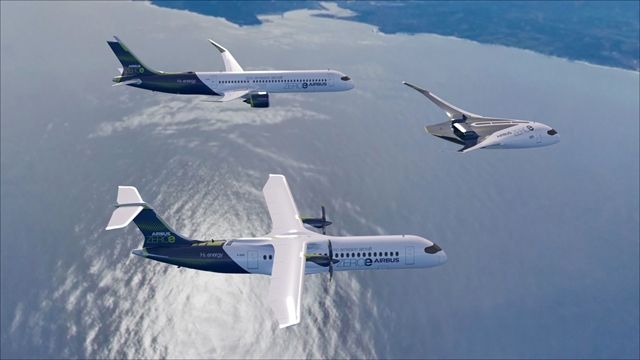In the latest move to realise its ambition, on September 21, Airbus revealed three different aircraft concepts that run on hydrogen, a disruptive zero-emission technology with the potential to reduce aircraft emissions by up to 50 per cent.

The world’s first zero-emission commercial planes fuelled by hydrogen would likely take to the skies by 2035, Europe’s giant plane maker Airbus has announced.
In the latest move to realise its ambition, on September 21, Airbus revealed three different aircraft concepts that run on hydrogen, a disruptive zero-emission technology with the potential to reduce aircraft emissions by up to 50 per cent.
“This is a historic moment for the commercial aviation sector as a whole, and we intend to play a leading role in the most important transition this industry has ever seen,” Airbus CEO Guillaume Faury said.
Faury said he believed that the use of hydrogen, both in synthetic fuels and as a primary power source for commercial aircraft, has the potential to significantly reduce aviation's climate impact.
The three ZEROe concepts include a turbofan, a turboprop and blended-wing body design, according to Airbus.
The turbofan design would carry 120 to 200 passengers with a range of over 2,000 nautical miles. It will be powered by a modified gas-turbine engine running on hydrogen, rather than jet fuel, through combustion. The liquid hydrogen will be stored and distributed via tanks located behind the rear pressure bulkhead.
The turboprop design would also use modified gas-turbine but could carry up to 100 passengers for 1,000 nautical miles on short-haul trips.
Meanwhile, one plane has an exceptionally wide body that blends into the plane’s wings to open up multiple options for hydrogen storage and distribution and cabin layout. This plan could carry up to 200 passengers.
“These concepts will help us explore and mature the design and layout of the world’s first climate-neutral, zero-emission commercial aircraft, which we aim to put into service by 2035,” Faury said.
In order to meet this ambitious 2035 target, Airbus said it would need to launch the ZEROe aircraft programme by 2025. This time frame gives its engineers approximately five years to mature all the required hydrogen technologies.
Over the coming months, several hydrogen demonstrator programmes, which will test hydrogen fuel cell and hydrogen combustion technologies respectively, are estimated to be formally launched. A full-scale aircraft prototype is estimated to arrive by the late 2020s.
However, the transition to hydrogen would require decisive action from the entire aviation ecosystem with support from governments being the key, Faury said.
This assistance would include increased funding for research and technology, as well as mechanisms that encourage the use of sustainable aviation fuels and prompt airlines to replace less environmentally friendly planes earlier, he added.
During a virtual media call on September 22, Airbus Asia-Pacific President Anand Stanley also said their plans could be realised in a “very short time frame” with support from governments, regulators and the industry.
“Given that the time frame is so short, despite the COVID crisis, we believe we have to continue to progress with the concepts, the projects and even come up with demonstrators in a matter of months, not years,” he said.
Currently, aviation is responsible for 3.6 per cent of EU greenhouse gas emissions. Modern planes use kerosene as fuel, releasing harmful carbon dioxide into the atmosphere. Finding alternative fuels that don’t produce harmful emissions such as hydrogen is one possible solution to address this issue.
An EU-backed study published in May made up the case for hydrogen as one of the best ways to clean up aviation, touting the CO2-free nature of the fuel, if produced using renewable energy, and the reduction in non-CO2 impacts of flying.
It also stated out that hydrogen is best suited to short-and medium-haul planes, given the significant costs associated with adapting long-range jets.
“As recently as five years ago, hydrogen propulsion wasn’t even on our radar as a viable emission-reduction technology pathway,” explains Glenn Llewellyn, Airbus Vice President, Zero-Emission Aircraft.
“But convincing data from other transport industries quickly changed all that. Today, we’re excited by the incredible potential hydrogen offers aviation in terms of disruptive emissions reduction.” — VNS





